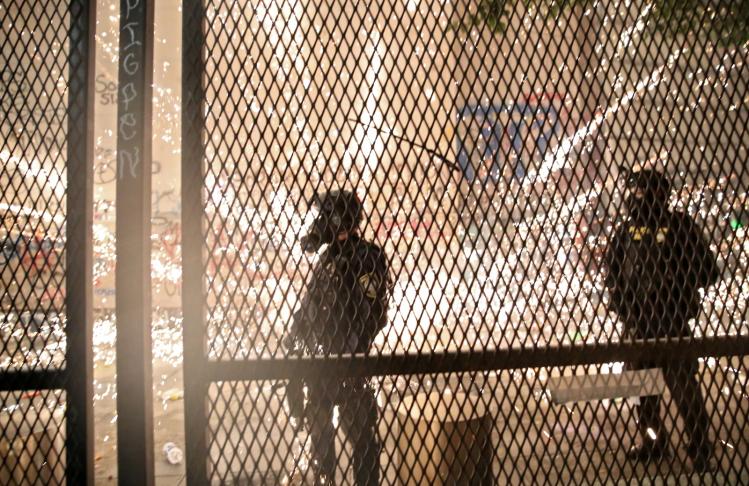
During a Supreme Court argument in 2018, Justice Sonia Sotomayor bluntly declared that it was “lawlessness” for the government to jail immigrants arrested at the border indefinitely without a bond hearing. Her five conservative colleagues on the court thought otherwise, and ruled that the plain language of the federal immigration law allowed it.
One consequence of President Donald Trump’s order to send federal immigration enforcers to street-level duty in Portland, Oregon, is that Americans will get a better sense of the constitutional netherland in which these agents normally operate. In a short time, their conduct has already prompted investigations by the inspectors general of the Homeland Security and Justice departments. A federal judge issued an order on July 23 barring the federal agents “from arresting, threatening to arrest, or using physical force directed against any person whom they know or reasonably should know is a Journalist or Legal Observer...unless the Federal Defendants have probable cause to believe that such individual has committed a crime.” And Oregon Attorney General Ellen Rosenblum filed suit seeking a court order barring federal agents from unlawfully detaining Oregon residents, a request that a judge denied July 24 on jurisdictional grounds. In court documents, Rosenblum’s office challenged the Department of Homeland Security over “a federal strategy to terrorize Portland protestors, presumably in an effort to quell ongoing protests.”
Investigators in U.S. Customs and Border Protection and Immigration and Customs Enforcement are accustomed to making arrests without warrants, and then holding people for long periods of time without filing charges, and longer periods before a court hearing is granted. That’s because the usual constitutional protections that apply in criminal cases don’t help immigrants jailed pending possible deportation, a civil charge. The results of that are often shocking. Occasionally, the federal courts intervene, but the immigration law that Congress passed in 1996 (and is incapable of changing) sharply limits what a judge can do to protect detainees’s constitutional right to due process.
Nonetheless, judges have found serious violations. In the Tucson area, CBP routinely held migrants arrested at the border in horrendous conditions for days on end. The border holding areas weren’t built for an overnight stay; a design allowing seven square feet per person makes it difficult to sleep on the concrete floor. But, as U.S. District Judge David Bury determined earlier this year, more than a third were held for over two days in 2019, with one in five for more than three days. “Surveillance video reveals overcrowding so severe that, at times, detainees have no place to sit, much less lie down on mats; detainees (including children) sleep in toilet stalls for lack of space,” he wrote, ordering that detainees be granted such basics as access to drinking water and a shower, and a bed with a blanket instead of a concrete floor and a filmy cover of stretched polyester. He found it necessary to add a footnote defining a shower: “A shower is a bath in which water is showered (as in to wet with a spray, fine stream, or drops) on the body. Webster’s Dictionary (1979). A ‘paper-shower’ or ‘shower-wipe,’ by definition, is not a shower.”
A Department of Homeland Security inspector general report last year found that in the Rio Grande Valley, it wasn’t uncommon for detainees to be held for more than ten days in the supposedly short-term Border Patrol lockup. The detainees are eventually transferred to the custody of ICE, which can be very slow about filing deportation charges with the immigration court—typically, six days nationally. It is a long time to be held in jail without formal charges—and it takes a median of two weeks more for a first hearing before an immigration judge.
Such laxity about detaining people in the absence of formally filed charges may be routine in the world of immigration enforcement, but not in criminal courts, where detainees are supposed to get a prompt hearing before a judge, usually in no more than forty-eight hours. The Oregon attorney general’s lawsuit doesn’t challenge President Trump’s right to send federal law enforcement into Portland. Rather, it takes aim at arrests made without establishing probable cause that a crime was committed.
Mark Pettibone is Exhibit A. In a court filing, he recounted what he said happened to him as he walked home at 2 a.m. on July 15 after taking part in a Black Lives Matter demonstration:
Without warning, men in green military fatigues and adorned with generic “police” patches, jumped out of an unmarked minivan and approached me. I did not know whether the men were police or far-right extremists, who, in my experience, frequently don military-like outfits and harass left-leaning protesters in Portland. My first thought was to run. I made it about a half-block before I realized there would be no escape from them. I sank to my knees and put my hands in the air. I was detained and searched by these men. One man asked me if I had any weapons. I did not. They drove me to the federal courthouse in Portland and placed me in a holding cell.
He was later released without any charges. Federal authorities did not dispute his account, but the judge in the case said it would be up to an individual to sue over a violation of rights, rather than the state. The Oregon attorney general’s lawsuit asserts that “Citizens who are reasonably afraid of being picked up and shoved into unmarked vans—possibly by federal officers, possibly by individuals opposed to the protests—will feel compelled to stay away, for their own personal safety, and will therefore be unable to express themselves in the way that they have the right to do.”
The more typical detainees of ICE and the border patrol—migrants from south of the U.S. border—are already familiar with such fears. The rest of us are catching up.
